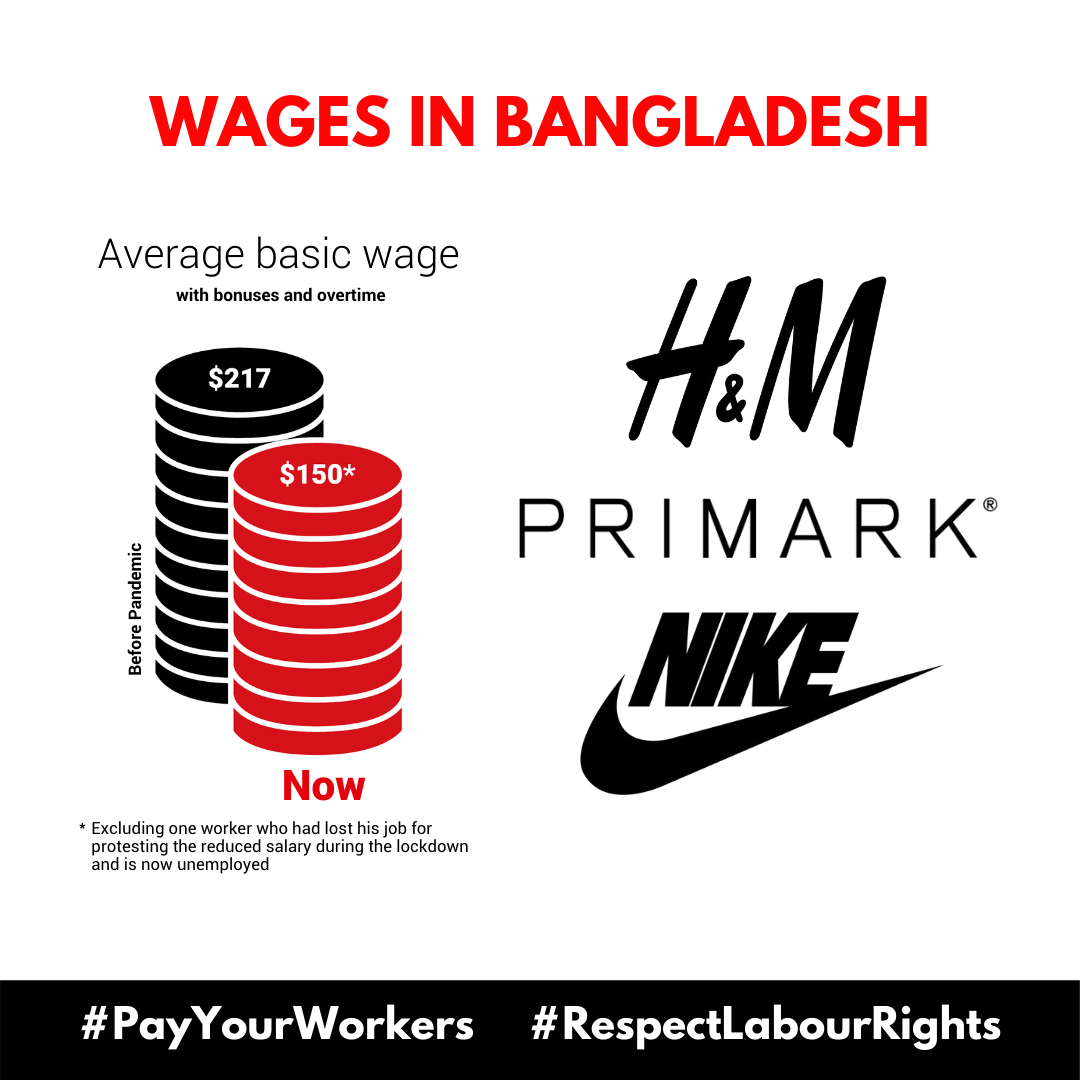
H&M, Nike and Primark use pandemic to squeeze factory workers in production countries even more
In a hard-hitting new research report, Clean Clothes Campaign finds that H&M, Nike and Primark have driven factory workers in their supply chains in Bangladesh, Cambodia and Indonesia into desperation during the COVID-19 pandemic. Interviews conducted with 49 garment workers in these countries demonstrate that the Coronavirus-induced crisis continues to have a devastating impact on the wages, working conditions, and labour rights of garment workers.
Over half of the workers interviewed for the report, “Breaking Point: wage theft, violence and excessive workloads are pushing garment workers to breaking point during the pandemic”, indicated to the researchers that they experienced wage cuts during the pandemic. Almost 70% of the interviewed workers have endured periods in which they were not paid their normal, pre-pandemic wages. All of these workers were surviving on poverty wages before the pandemic, and now it has become even harder for them to make ends meet. The research shows that this is happening to workers in all three brands’ supply chains.
Clean Clothes Campaign (CCC) chose to research three brands that made considerable profits over the last year and appeared often on its liveblog that keeps track of reported violations in garment factories and garment producing countries. “When reports provide a generalised overview of the industry, brands often deny that reported violations occur within their own supply chains, defending their business models with unsubstantiated claims,” explained Meg Lewis, author of Breaking Point. “While this report takes a deeper dive into three brands’ supply chains, we emphasize that many other companies have committed similar violations.”
The research shows that wage theft during the pandemic has occurred in H&M’s, Primark’s and Nike’s supply chains; they are clearly not doing enough to protect workers from the financial impact of the COVID-19 crisis that is for a large extend caused by their own business decisions to cancel or cut down orders and push down prices. The average monthly income of the interviewed workers has decreased. Eleven Primark workers estimate that they are owed $2890 combined, eighteen H&M workers estimate the amount owed to them is $2368 and thirteen Nike workers estimate they are owed $1527. Furthermore, workers report increased production targets, unsafe working conditions, and harassment from management.
“The stories that workers shared with us are full of despair and fear: “will I have an income this month and will I be able to feed my family today?” Put simply, brands and factories are pushing workers beyond their breaking point during the pandemic,” said Meg Lewis.
The significance of a decrease in pay cannot be underestimated for garment workers and their families, who had been barely surviving on poverty wages prior to the pandemic. The report says that global brands are not doing enough to ensure that garment workers do not have to pay the price for brands’ financial decisions during the pandemic.
“We have been severely exploited in the name of pandemic. The COVID-19 pandemic was not our fault, but it was us who were given less than half of our normal salary. At first we protested, but the factory management said, ‘If you protest or form a union, you will not get a penny from us and you will not only lose your job, but also you will be evicted from this area and will never get a job in any other factory again.’ So, none of us could form a union in this factory.”
Worker of a facility producing for H&M in Bangladesh
“I have to pay debt, water, and electricity bills monthly, but my wages are not enough. I don't want to see high production targets with a decreasing number of workers to meet them. We don't have enough income to pay for our basic living costs.”
Worker producing for Primark in Cambodia
The report adds to the growing body of evidence that garment brands have failed to protect the workers in their supply chains since the onset of the pandemic. At the onset of the pandemic, brands and retailers refused to pay for an estimated US$ 40 billion worth of goods, including clothing already in production or even completed. Mass cancellations, delayed payments, and discounts imposed on suppliers sent financial shock waves through the industry and have had devastating impacts on garment workers. Globally, garment workers are owed billions in unpaid wages, bonuses, and severance pay since the pandemic began. While many major brands have since agreed to pay in full for orders that had already been in production (as evidenced on the Worker Rights Consortium brand tracker), they have not committed to ensuring that workers within their supply chains receive their regular wages throughout the pandemic.
Clean Clothes Campaign has been urging brands to take their responsibility to ensure that workers in their supply chains are paid in full. Since March 2021, a coalition of over 200 unions and labour rights organisations called upon brands to negotiate directly with unions in the sector on an enforceable agreement on wage assurance, severance, and basic labour rights to fill the pandemic-era wage gap, ensure workers who are terminated receive their full severance, support stronger social protections for all workers, and to ensure basic labour rights are respected.
Read the full report here.